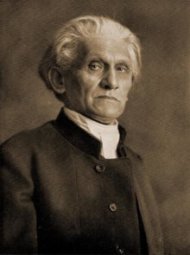On Behalf of Ignorance: Stefan George

Among the scholars, of course Eric Voegelin comes to our mind, and Hegel (rather as Batman brings to mind the Riddler), and among the poets, along with Goethe and Rilke, Stefan George.
Now, at this point, July 2009, what we know about Stefan George [is the common knowledge of the ignorant and] could be summarized as:
Item: Once, he was famous.
Item: Now, he’s infamous.
Item: He was 100% top-to-bottom no-holds-barred weird.
This is prime quality ignorance, just prime—which we hope to remedy, of course, perhaps this fall, since, after all, nobody really approves of ignorance.
And yet, if we could find some practical uses for ignorance, wouldn’t it be handy? After all, it’s so plentiful. It is true that ignorance has a dark side. We can use ignorance to excuse ourselves from legitimate duties (get Henry to do the spreadsheet. I don’t know Excel) or from legitimate restraints (Your Honor, I really really didn’t know she was only 14).
But consider ignorance as part of knowing. Ignorance can be thought of as what we know we don’t know, an intellectual question mark, (χωρα) a known-unknown, to use a phrase that received unjustified scorn a few years back. This kind of understood unknowing may have practical uses, and beyond that, philosophic value.
First, on the way to estimating our ignorance, on whatever topic, we have to inventory what we (think) we know now, and the grounds on which we affirm we know it. This can be usefully humbling.
One might imagine a dialogue between one’s better self and one’s other self:
Magister: Tell me something about Stefan George.
Insipiens: He liked blond teenage boys.
Magister: How do you know that?
Insipiens: Read it in Wiki.
Magister: Wiki???
This is the sort of clarifying exchange that might lead one to withdraw from the world altogether (and it might have gotten Socrates indicted).
Secondly, when we have established on the intellectual wilderness map a few scattered trading posts of truth, the wide white uncharted spaces isolate one in an anxious uncertainty. This too can be useful. It certainly puts us a small step ahead in deciding where we want to send inquiry (and leads to the question “why there?”) and where we don’t feel like mounting an expedition (why is that, by the way?), and where it is pointless to go (such as the question of the real order of the Platonic corpus).
Thirdly, when we have filled-in ignorance, completely or in part, and come to know the benighted state where we began we are afforded a sort of base-line to measure improvement. This is a help to planning further improvement.
Moreover, it is a help psychologically. “Education not easy” remarked the interpreter in Tea-house of the August Moon. “Often very painful.” To know that one has come a distance can be a some comfort in a struggle that is often more like mud wrestling than chess.
Beyond this, are ethical and philosophic issues.
Socratic humility is, of course, useful for curing oneself of illusions. But it also is a help to opening the questioner to the call of learning something new. To recognize deficiency is to admit need and that is the essential element of wanting something better. Moreover, generally speaking, one of the things we begin to notice when we notice our ignorance is that we exist and have existed all along in an on-going tension between what we are and what we could be (if we try) and what we might be (if we don’t).
So we recognize our present image of Stefan George as a caricature, and in understanding that, we realize we don’t even know how much of a caricature, and we won’t until we use ignorance to get to truth. The situation is certainly tense, metaxic even.




